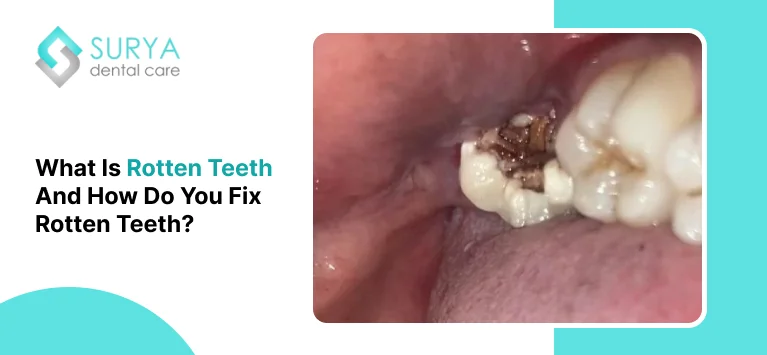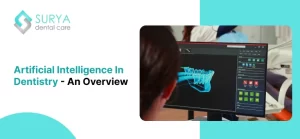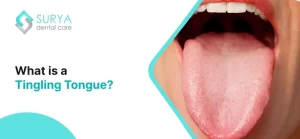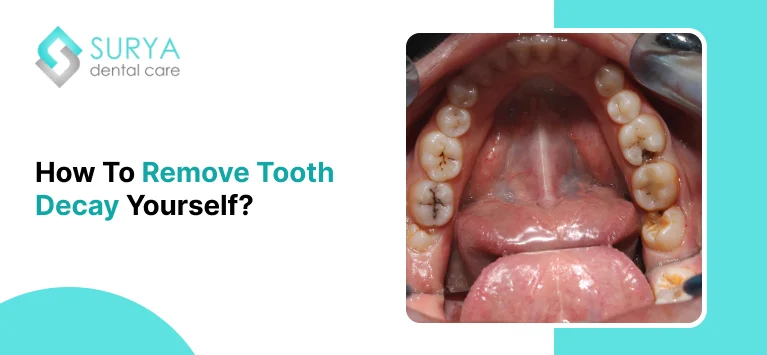Rotten teeth are a miserable condition that collapses your healthy teeth to cause bad breath and bad shape. Most of the individuals experience bad breath caused due to rotting of the teeth, but they use over-the-counter remedies like mouth fresheners, chewing gums and digestive supplements. So, knowing about rotten teeth, symptoms of rotten teeth, and causes and treatment options to get rid of rotten teeth is necessary to avoid health complications caused by rotten teeth. These all are explained in this blog post. So continue reading to avoid having miserable bad breath and bad teeth by not letting rotten teeth affect you.
What is Rotten Teeth?
Rotten teeth are a common dental problem where one or more teeth are destroyed due to untreated tooth decay. This is caused by the buildup of a large number of bacteria due to poor oral hygiene and consumption of excess sugary foods. It may even cause holes in teeth and lead to tooth loss.
Treating tooth decay as soon as possible after you notice it is important as you delay the consequences of tooth decay also increase.
Symptoms of Rotten teeth
Normally, setting up regular dental visits can help you identify cavities because cavities do not show any symptoms, so you can avoid developing tooth decay by getting rid of cavities in the early stage of your dental check-up.
If an untreated cavity is developed into tooth decay, then it causes very complicated symptoms like,
- Toothache
- Tooth Sensitivity
- Bad breath
- Bad taste in the mouth
- Holes in the teeth
- White, black or brown spots on teeth
- Pain while biting
Rotten teeth affect people of all ages, and the symptoms of rotten teeth in adults and children are the same.
Causes of Rotten Teeth
Rotten teeth are caused by the accumulation of bacteria in the teeth, and if you do not have proper dental hygiene, then it could lead to the buildup of bacterial plaque. Here are some of the factors that lead to the rotten teeth.
- Poor Oral Hygiene – Infrequent brushing and flossing allow bacteria and plaque to accumulate, leading to cavities and eventual tooth decay.
- Excessive Sugar & Starch Intake – Sugary and starchy foods fuel harmful bacteria in the mouth, producing acids that erode tooth enamel.
- Acidic Foods & Beverages – Frequent consumption of acidic drinks like soda, fruit juices, and energy drinks weakens enamel, making teeth more susceptible to decay.
- Dry Mouth (Xerostomia) – Saliva helps neutralize acids and wash away food particles. Reduced saliva production increases the risk of tooth decay.
- Frequent Snacking – Constantly eating or drinking sugary foods provides a continuous supply of fuel for bacteria, accelerating decay.
- Plaque & Tartar Buildup – If plaque is not removed through brushing and flossing, it hardens into tartar, which harbours bacteria and damages teeth.
- Genetic Factors – Some people are more prone to cavities and decay due to genetic variations in enamel strength and saliva composition.
- Gum Disease (Periodontal Disease) – Advanced gum disease can contribute to tooth decay by weakening the supporting structures of the teeth.
- Smoking & Tobacco Use – Tobacco products reduce saliva production and increase plaque formation, leading to faster tooth decay.
- Lack of Regular Dental Check-ups – Skipping dental visits prevents early detection and treatment of decay, allowing cavities to worsen into rotten teeth.
Foods to eat and not to when you have rotten teeth
Being aware of what to eat and not to eat is very important because some foods also can damage your teeth further.
Foods to avoid
- Sugary foods
- Hard foods
- Sticky foods
- Acidic foods
Recommended Foods
- Non-sugary fluids
- Vegetables
- Soft foods
- Lean proteins
Diagnosis and Treatment for Tooth Decay
Dentists recommend every one of their patients to go for a routine dental checkup. This could help to get rid of cavities in the teeth, which do not show any sign that they are present. If you develop a cavity, it may develop into tooth decay, which may advance its development and even lead to tooth loss.
So the treatment for rotten teeth is done based on the stages of it
- Cavity stage
- Beginning tooth decay stage
- Advanced tooth decay
Cavity stage
Dentists check for the presence of cavities and provide fluoride treatment to make the teeth stronger to avoid the formation of plaque.
Beginning of tooth decay
If you are affected by a cavity that has spread to the pulp, then the dentist may recommend going for deep teeth cleaning and preventing the unaffected tooth by providing a crown.
Advanced tooth decay
Cavities form infections called decay that spreads faster. So, an untreated cavity and tooth decay spread faster to the center of the tooth, damaging the pulp and causing swelling, bad breath and other dangerous symptoms. To avoid all this pain and discomfort, dentists will perform root canal treatment to remove the affected nerves and pulp.
Takeaway
Rotten teeth condition shows how important regular dental checkups are because they help identify cavities and help individuals avoid rotten teeth. Maintaining oral hygiene is very important to avoid the building of bacteria, which helps avoid major dental problems, including rotten teeth. If you are looking for a regular dental checkup or to get rid of rotten teeth, then contact Surya Dental Care.
FAQs
Yes, a dentist can fix rotten teeth depending on the severity of the decay. For early-stage cavities, treatments like fluoride applications or fillings can restore the tooth. If the decay has progressed significantly, options may include root canal therapy, crowns, or extraction followed by implants or bridges to replace missing teeth.
Rotten teeth can often be fixed, particularly in the early stages of decay. Treatments such as fluoride treatments and fillings are effective for small cavities. However, if the decay is extensive and has affected the tooth pulp, more invasive procedures like root canals or extractions may be necessary.
While it is not advisable to attempt fixing a rotten tooth at home, maintaining good oral hygiene can help manage early decay. Rinsing with salt water, using fluoride toothpaste, and avoiding sugary foods may support dental health. However, professional dental treatment is essential for effective repair.
Yes, rotten teeth can cause bad breath due to the bacteria that thrive in decayed areas. The decomposition of food particles and dental plaque associated with tooth decay can produce foul odors. Treating the underlying dental issues is necessary to eliminate bad breath effectively.
Signs of a rotten tooth include visible holes or dark spots on the tooth surface, sensitivity to hot or cold foods, pain when biting down, and persistent bad breath. If you experience any of these symptoms, it is important to consult a dentist for evaluation and treatment.
Broken rotten teeth can often be fixed depending on the extent of damage. Treatments may include fillings for minor fractures or crowns for more significant damage. In severe cases where the tooth is beyond repair, extraction may be necessary, followed by options like implants or bridges.
Rotten teeth in adults are primarily caused by poor oral hygiene leading to plaque buildup and tooth decay. Other factors include high sugar consumption, dry mouth conditions, smoking, and lack of regular dental check-ups. Additionally, certain medical conditions and medications can contribute to an increased risk of tooth decay.









Leave a Comment